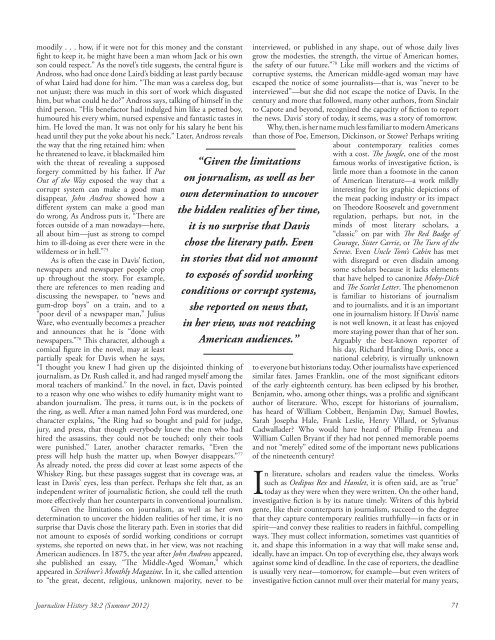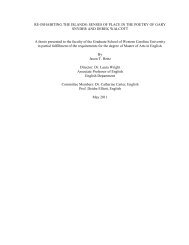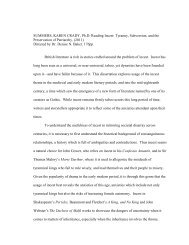Stories of Today: Rebecca Harding Davis' Investigative Fiction
Stories of Today: Rebecca Harding Davis' Investigative Fiction
Stories of Today: Rebecca Harding Davis' Investigative Fiction
Create successful ePaper yourself
Turn your PDF publications into a flip-book with our unique Google optimized e-Paper software.
moodily . . . how, if it were not for this money and the constant<br />
fight to keep it, he might have been a man whom Jack or his own<br />
son could respect.” As the novel’s title suggests, the central figure is<br />
Andross, who had once done Laird’s bidding at least partly because<br />
<strong>of</strong> what Laird had done for him. “The man was a careless dog, but<br />
not unjust; there was much in this sort <strong>of</strong> work which disgusted<br />
him, but what could he do?” Andross says, talking <strong>of</strong> himself in the<br />
third person. “His benefactor had indulged him like a petted boy,<br />
humoured his every whim, nursed expensive and fantastic tastes in<br />
him. He loved the man. It was not only for his salary he bent his<br />
head until they put the yoke about his neck.” Later, Andross reveals<br />
the way that the ring retained him: when<br />
he threatened to leave, it blackmailed him<br />
with the threat <strong>of</strong> revealing a supposed<br />
forgery committed by his father. If Put<br />
Out <strong>of</strong> the Way exposed the way that a<br />
corrupt system can make a good man<br />
disappear, John Andross showed how a<br />
different system can make a good man<br />
do wrong. As Andross puts it, “There are<br />
forces outside <strong>of</strong> a man nowadays—here,<br />
all about him—just as strong to compel<br />
him to ill-doing as ever there were in the<br />
wilderness or in hell.” 75<br />
As is <strong>of</strong>ten the case in Davis’ fiction,<br />
newspapers and newspaper people crop<br />
up throughout the story. For example,<br />
there are references to men reading and<br />
discussing the newspaper, to “news and<br />
gum-drop boys” on a train, and to a<br />
“poor devil <strong>of</strong> a newspaper man,” Julius<br />
Ware, who eventually becomes a preacher<br />
and announces that he is “done with<br />
newspapers.” 76 This character, although a<br />
comical figure in the novel, may at least<br />
partially speak for Davis when he says,<br />
“I thought you knew I had given up the disjointed thinking <strong>of</strong><br />
journalism, as Dr. Rush called it, and had ranged myself among the<br />
moral teachers <strong>of</strong> mankind.” In the novel, in fact, Davis pointed<br />
to a reason why one who wishes to edify humanity might want to<br />
abandon journalism. The press, it turns out, is in the pockets <strong>of</strong><br />
the ring, as well. After a man named John Ford was murdered, one<br />
character explains, “the Ring had so bought and paid for judge,<br />
jury, and press, that though everybody knew the men who had<br />
hired the assassins, they could not be touched; only their tools<br />
were punished.” Later, another character remarks, “Even the<br />
press will help hush the matter up, when Bowyer disappears.” 77<br />
As already noted, the press did cover at least some aspects <strong>of</strong> the<br />
Whiskey Ring, but these passages suggest that its coverage was, at<br />
least in Davis’ eyes, less than perfect. Perhaps she felt that, as an<br />
independent writer <strong>of</strong> journalistic fiction, she could tell the truth<br />
more effectively than her counterparts in conventional journalism.<br />
Given the limitations on journalism, as well as her own<br />
determination to uncover the hidden realities <strong>of</strong> her time, it is no<br />
surprise that Davis chose the literary path. Even in stories that did<br />
not amount to exposés <strong>of</strong> sordid working conditions or corrupt<br />
systems, she reported on news that, in her view, was not reaching<br />
American audiences. In 1875, the year after John Andross appeared,<br />
she published an essay, “The Middle-Aged Woman,” which<br />
appeared in Scribner’s Monthly Magazine. In it, she called attention<br />
to “the great, decent, religious, unknown majority, never to be<br />
“Given the limitations<br />
on journalism, as well as her<br />
own determination to uncover<br />
the hidden realities <strong>of</strong> her time,<br />
it is no surprise that Davis<br />
chose the literary path. Even<br />
in stories that did not amount<br />
to exposés <strong>of</strong> sordid working<br />
conditions or corrupt systems,<br />
she reported on news that,<br />
in her view, was not reaching<br />
American audiences.”<br />
interviewed, or published in any shape, out <strong>of</strong> whose daily lives<br />
grow the modesties, the strength, the virtue <strong>of</strong> American homes,<br />
the safety <strong>of</strong> our future.” 78 Like mill workers and the victims <strong>of</strong><br />
corruptive systems, the American middle-aged woman may have<br />
escaped the notice <strong>of</strong> some journalists—that is, was “never to be<br />
interviewed”—but she did not escape the notice <strong>of</strong> Davis. In the<br />
century and more that followed, many other authors, from Sinclair<br />
to Capote and beyond, recognized the capacity <strong>of</strong> fiction to report<br />
the news. Davis’ story <strong>of</strong> today, it seems, was a story <strong>of</strong> tomorrow.<br />
Why, then, is her name much less familiar to modern Americans<br />
than those <strong>of</strong> Poe, Emerson, Dickinson, or Stowe? Perhaps writing<br />
about contemporary realities comes<br />
with a cost. The Jungle, one <strong>of</strong> the most<br />
famous works <strong>of</strong> investigative fiction, is<br />
little more than a footnote in the canon<br />
<strong>of</strong> American literature—a work mildly<br />
interesting for its graphic depictions <strong>of</strong><br />
the meat packing industry or its impact<br />
on Theodore Roosevelt and government<br />
regulation, perhaps, but not, in the<br />
minds <strong>of</strong> most literary scholars, a<br />
“classic” on par with The Red Badge <strong>of</strong><br />
Courage, Sister Carrie, or The Turn <strong>of</strong> the<br />
Screw. Even Uncle Tom’s Cabin has met<br />
with disregard or even disdain among<br />
some scholars because it lacks elements<br />
that have helped to canonize Moby-Dick<br />
and The Scarlet Letter. The phenomenon<br />
is familiar to historians <strong>of</strong> journalism<br />
and to journalists, and it is an important<br />
one in journalism history. If Davis’ name<br />
is not well known, it at least has enjoyed<br />
more staying power than that <strong>of</strong> her son.<br />
Arguably the best-known reporter <strong>of</strong><br />
his day, Richard <strong>Harding</strong> Davis, once a<br />
national celebrity, is virtually unknown<br />
to everyone but historians today. Other journalists have experienced<br />
similar fates. James Franklin, one <strong>of</strong> the most significant editors<br />
<strong>of</strong> the early eighteenth century, has been eclipsed by his brother,<br />
Benjamin, who, among other things, was a prolific and significant<br />
author <strong>of</strong> literature. Who, except for historians <strong>of</strong> journalism,<br />
has heard <strong>of</strong> William Cobbett, Benjamin Day, Samuel Bowles,<br />
Sarah Josepha Hale, Frank Leslie, Henry Villard, or Sylvanus<br />
Cadwallader? Who would have heard <strong>of</strong> Philip Freneau and<br />
William Cullen Bryant if they had not penned memorable poems<br />
and not “merely” edited some <strong>of</strong> the important news publications<br />
<strong>of</strong> the nineteenth century?<br />
In literature, scholars and readers value the timeless. Works<br />
such as Oedipus Rex and Hamlet, it is <strong>of</strong>ten said, are as “true”<br />
today as they were when they were written. On the other hand,<br />
investigative fiction is by its nature timely. Writers <strong>of</strong> this hybrid<br />
genre, like their counterparts in journalism, succeed to the degree<br />
that they capture contemporary realities truthfully—in facts or in<br />
spirit—and convey these realities to readers in faithful, compelling<br />
ways. They must collect information, sometimes vast quantities <strong>of</strong><br />
it, and shape this information in a way that will make sense and,<br />
ideally, have an impact. On top <strong>of</strong> everything else, they always work<br />
against some kind <strong>of</strong> deadline. In the case <strong>of</strong> reporters, the deadline<br />
is usually very near—tomorrow, for example—but even writers <strong>of</strong><br />
investigative fiction cannot mull over their material for many years,<br />
Journalism History 38:2 (Summer 2012)<br />
71
















